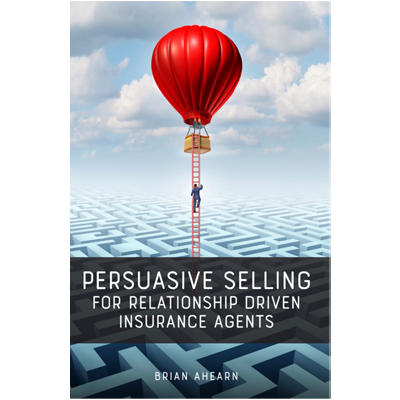Book Store
Author Details How Psychology Can Help Agents Assist Clients, Boost Sales
Brian Ahearn’s book also talks about how to deal with different personality types.
- Lori Chordas
- December 2021
-





Persuasive Selling for Relationship Driven Insurance Agents

Brian Ahearn

Consumer behavior is powerful, and when insurance agents have a better understanding about how consumers act and communicate, that insight makes it easier for customers to say “yes” to a sale, according to Brian Ahearn, chief influence officer at Influence People LLC, in his latest book, Persuasive Selling for Relationship Driven Insurance Agents.
Selling success also comes from building relationships with different types of people. In his book, Ahearn introduces the “D-E-A-L” model, or what he describes as driver, expressive, amiable and logical personality types. He said when agents comprehend the psychology behind the traits of each, they can use different practices to interact with and meet the needs of a wide array of audiences. Following is an edited transcript of an interview with AM Best TV.
What are the keys to success when it comes to selling insurance?
At a high level, sales starts with building relationships, dealing with any concerns that a client has and then, hopefully, closing the sale. The book looks at eight steps in the selling process. A key to selling is understanding how people think and behave and being willing to change how you interact with consumers.
What do agents need to do to make it easier for people to say “yes” to them in an ethical manner?
Persuasion is more than changing hearts and minds. Ultimately, we are looking to change behavior. People often won't do something unless you communicate it to them, so how you communicate can make all the difference in the world. Research has discovered seven universal principles of persuasion and that when you tap into them ethically and correctly, it makes it easier for people to say “yes” to you. For example, we naturally follow the lead of somebody we look at as having superior wisdom or expertise. The problem is often somebody doesn't know what your expertise is. There may be an opportunity in a very natural, conversational way to put that out there.
What can people take away from the book?
I hope they'll recognize that ethical influence is a skill that's critical for their professional success. Because it's a skill, it can be learned, practiced and perfected. There are certain skills that we don't possess or we may never acquire, but this skill of influence isn't like that. It's just the choice, “Will I learn what the research has to say? Will I begin to practice by putting it into play, and will I look to perfect it?” We need to ask, “What went well? How can I refine my conversations so I become more effective?” The goal is not just for agents to sell more insurance, but to help their customers. By helping their customers the right way, agents will end up selling more insurance.
AM Best Trilogy
AM Best details the history of AM Best, credit rating agencies and the life of Alfred M. Best.
The Company—A History of AM Best
The Industry—A History of Credit Rating Agencies
The Man—A Biography of Alfred M. Best
Go to Amazon to find these and other books.
Send us your book recommendations at bestreviewcomment@ambest.com.